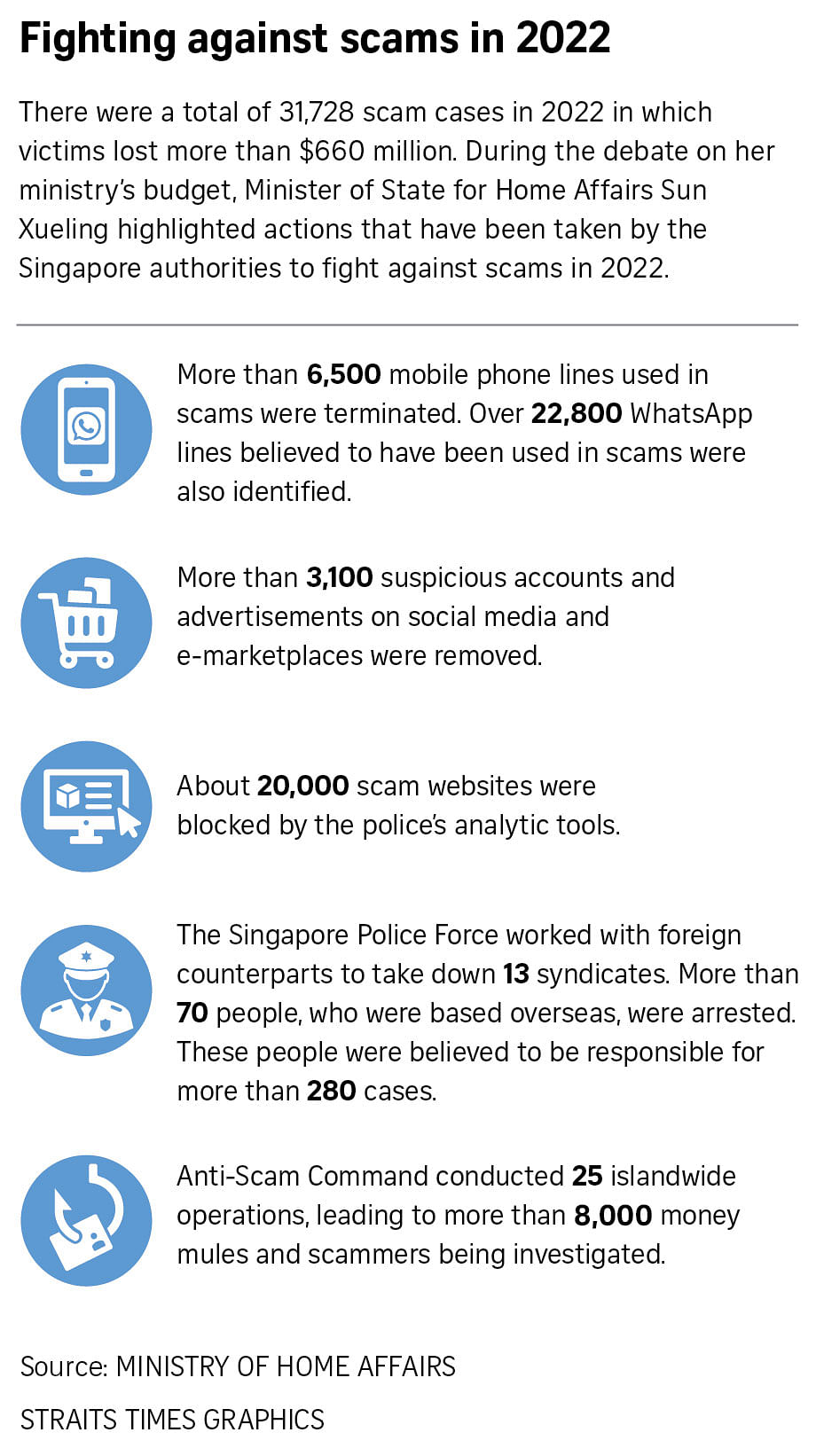SINGAPORE - Singapore is fighting a war against scams, and it needs stronger defences and more effective weapons to win this battle.
With more than 31,700 cases and $660 million lost in 2022, the country will need the whole community to step up and take action to protect themselves and their loved ones from scams, said Minister of State for Home Affairs Sun Xueling.
Speaking during the debate on the Ministry of Home Affairs’ (MHA) budget on Monday, she said the authorities have been bolstering defences and fighting back against scammers.
She said new defensive anti-scam measures that are being examined include giving the public the option to block international calls and SMSes, and to verify calls from government officials. More details will be released later.
Ms Sun added that the Monetary Authority of Singapore (MAS) and Association of Banks in Singapore (ABS) are exploring a money-lock solution for bank customers to lock up a designated sum in their bank accounts.
Mr Frankie Phua, head of group risk management at UOB, previously spoke about the solution on The Straits Times’ Stop Scams podcast.
Ms Sun said: “We have a war against scams on our hands.
“No defence is impenetrable. Some scams will succeed... we have thus strengthened our enforcement capabilities to minimise the number of victims and amounts lost to scammers.”
Ms Sun said defensive anti-scam measures that have been taken include the blocking of scam calls, SMSes, online listings and websites, and the securing of government services and banking channels.
In 2022, more than 6,500 mobile phone lines that were used to perpetuate scams were terminated through collaboration between the police, Infocomm Media Development Authority (IMDA) and telecommunications companies.
Police collaboration with social media companies and e-commerce marketplaces also saw the removal of more than 3,100 accounts and advertisements in 2022 for their suspected involvement in scams.
Analytic tools used by the police were also able to identify and block about 20,000 scam websites.

Ms Sun said that in the past year, various anti-scam measures introduced by MAS and ABS included a cooling-off period for new digital tokens, removal of clickable links from official messages, and an emergency kill-switch that allows customers to suspend their accounts quickly if compromised.
Most recently, IMDA mandated the SMS Sender ID registration, implementing filters to detect potential scam SMSes and flagging unregistered senders as “likely scam”.
All government agencies have been onboarded onto the registry, said Ms Sun.
But as scams constantly evolve, so too must our defences, she added.
She said: “The best defence against scams is a vigilant and discerning public. To defend ourselves and our loved ones, we need to move beyond awareness, to mobilise every citizen to take action against scams.”
In January, a new national anti-scam campaign with the tagline “I can ACT against scams” was launched, with the ACT acronym outlining how members of the public can Add security features, Check for signs, and Tell the authorities and others about scams.
Ms Sun said the Scam Public Education Office will be launched in 2023 to expand the outreach of anti-scam public education.
She urged members of the public to also download and use the ScamShield app, which will soon include a WhatsApp chatbot for the public to report scam messages.
She said: “By playing your part in reporting scam calls, SMSes and WhatsApp messages, you protect others by enabling the police to detect scam messages and fraudulent WhatsApp accounts much more quickly and put them on a blacklist.”
Ms Sun said the police’s Anti-Scam Command conducted 25 islandwide anti-scam enforcement operations in 2022, leading to more than 8,000 money mules and scammers being investigated.
The police also worked with foreign counterparts and took down 13 syndicates and arrested more than 70 people based overseas who were responsible for more than 280 scam cases in 2022.
Responding to a question from Mr Christopher de Souza (Holland-Bukit Timah GRC) about the efforts taken in fighting scams, Ms Sun recounted a scam case she was privy to.
She said: “There was one victim, and guess how many accounts the original sums of monies went through? Eighty-nine bank accounts, that was how quickly bank accounts were set up, and the monies dispersed through the banking system.”
She added that this is why it is important to have Singapore’s seven retail banks co-located at the Anti-Scam Centre, so they can coordinate their efforts.
The law will also be tightened to clamp down on money mules, said Ms Sun.
She said the Corruption, Drug Trafficking and Other Serious Crimes (Confiscation of Benefits) Act will be amended to hold money mules criminally liable.
MHA is also working with the Smart Nation and Digital Government Office on legislative amendments to the Penal Code to curb abuse of Singpass credentials as a vector to perpetrate scams.
Ms Sun added that everyone has a part to play to keep Singapore safe and secure.
She said: “While the Government will step up measures to protect us against scams, we need to remain alert and ready to keep ourselves and our loved ones safe.
“Together, we will be able to fight the war against scams.”



